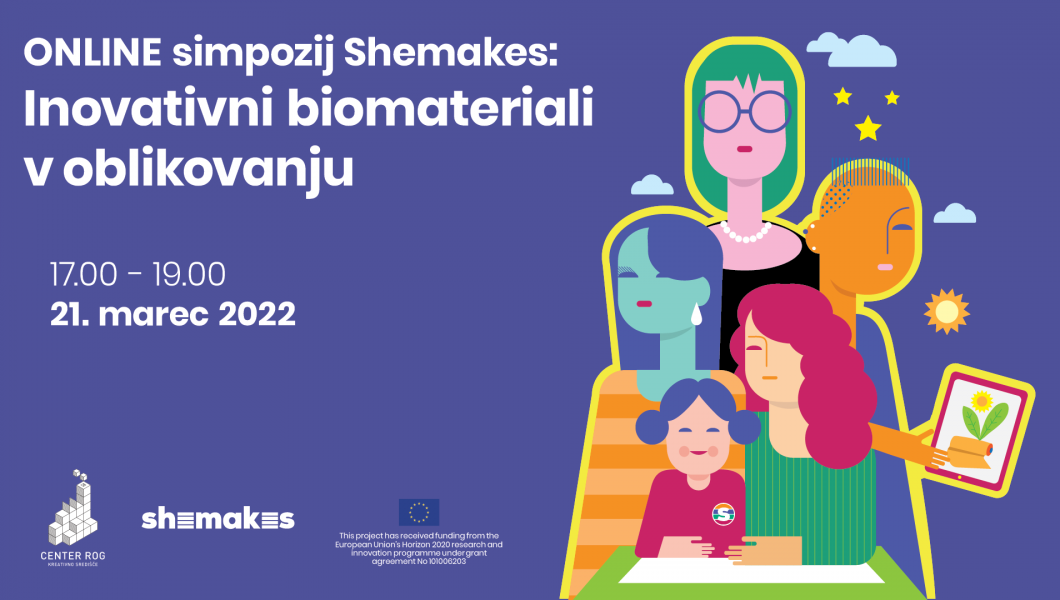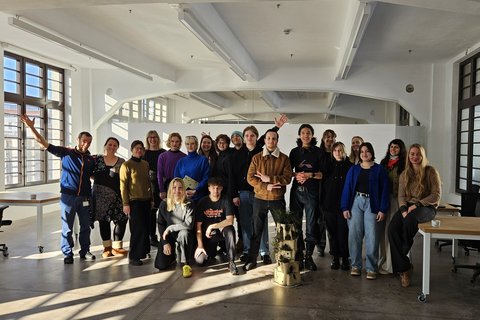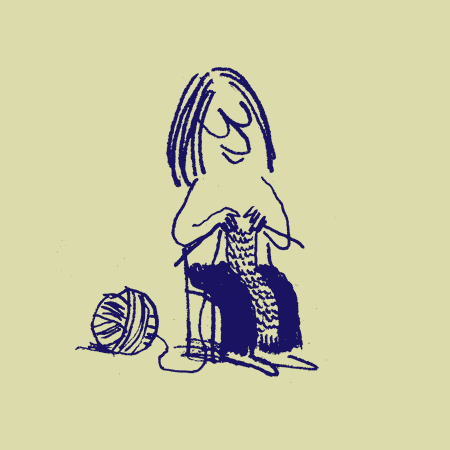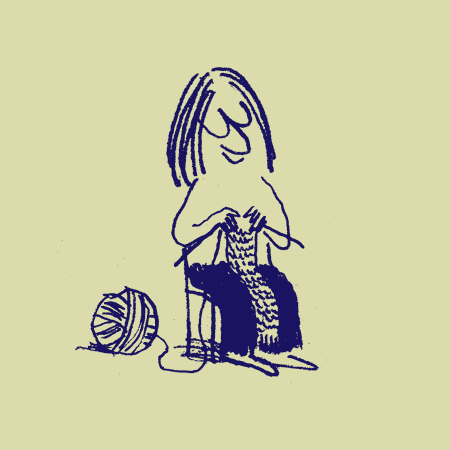Innovative Biomaterials in Design: a Shemakes symposium

Innovative Biomaterials in Design: a Shemakes symposium Monday 21 March 2022 17:00-19:00 You are warmly invited to this online symposium on Innovative Biomaterials in Design, which is being held as part of the Shemakes project. You can watch the symposium online, but if you wish to take part in the discussion with our guests, you will need to register using the form on our website.
Our guests will be joining us in a discussion about innovative biomaterials, widely considered to be the future of design. They comprise both international and local experts whose research and development work is focused on biomass, cellulose materials and biomaterials:
- Anastasia Pistofidou, from the IAAC Fab Lab Barcelona, Spain, will talk about the work of the Fab Textiles research lab and the Fabricademy, Textile and Technology open-source programme for innovation in the textile and clothing sector.
- Pirjo Kääriäinen, Associate Professor of Design and Materials at Aalto University, Finland, will discuss Chemarts, an interdisciplinary programme at the intersection of design and materials research.
- Lorena Trebbi, a Post-doc Researcher and Adjunct Professor in the Department of Planning, Design and Technology of Architecture at the Sapienza University of Rome, Italy, will present her work on biofabrication and the potential for implementing symbiotic processes between design and science.
- Dr Uroš Novak from the National Institute of Chemistry in Ljubljana, Slovenia, will give a presentation on his research in the fields of bioplastics, biocomposites and zero-waste technologies. Dr Novak is also an activist who promotes a plastic-free lifestyle as part of the BioApp movement.
- Dr Mija Sežun and Dr Igor Karlovits from the Pulp and Paper Institute specialise in the optimisation of biomass use in production, as well as processes for bio-waste reduction, recycling and reuse.
- Matea Benedetti, Fashion Designer and Associate Professor at the Faculty of Design, Trzin, Slovenia, will tell us how her Benedetti Life fashion label, with its emphasis on sustainability, innovation and eco materials, was created.
The event will be held in English and is aimed at anyone with an interest in the use of biomaterials in design and sustainable development in the spirit of the Shemakes project, which seeks to empower women innovators in the textile and clothing sector.
Programme:
17:00 ⎪ Welcome and introduction by Renata Zamida, Acting Director of the Rog Centre
17:05 ⎪ Presentation about the Shemakes project and the Innovative Biomaterials workshops, by Lucija Jankovec,
Project Manager, Rog Centre
17.10 ⎪ Lecture and presentations
18:10 ⎪ Moderated discussion about the future and role of women innovators in the textile and clothing sector,
followed by Q&A
19:00⎪ Close
About Shemakes:
Shemakes is a network of people working in labs or businesses who are actively helping increase the skills, confidence and status of women in the textile and clothing industry. Together, we are addressing the challenges facing women in the industry: their over-representation in the lowest-paid jobs, the systemic gender constructs that affect their status, and the low value assigned to their natural and acquired skills within traditional business structures. We strive to create opportunities and business structures (circular, sustainable, near-shored) that enable women to move into more senior, better-paid positions by giving them access to hard skills, technology and innovation as well as to networking, business modelling and role models.
This project has received funding from the European Union’s Horizon 2020 research and innovation programme under grant agreement no. 101006203. The views expressed herein reflect those of the author and the shemakes consortium; the EU/Commission is not responsible for any use that may be made of the information contained.
Our guests:
Anastasia Pistofidou is a long-standing member of the core team of IAAC Fab Lab Barcelona, having acted as a tutor, office manager for advanced manufacturing, coordinator and researcher. In 2013 she founded Fab Textiles, a research lab combining digital technologies and crafts with a focus on soft fabrication, textiles and materials. She is involved in setting up textile labs both as part of the Fab Lab Network and beyond, and also works with Fabricademy, Textile and Technology, a distributed education programme that shares open-source practices for innovation in the textile and clothing sector. In 2021 she co-led Remix El Barrio, a project to make biomaterial from food waste that won the European Starts Prize. She also works with the Fabship project to develop off-grid fablabs in rural areas.
Pirjo Kääriäinen is a professor of Design and Materials at Aalto University, Finland. For the last decade she has been co-ordinating CHEMARTS, an interdisciplinary collaboration between design and materials research that aims to inspire researchers and students to explore the uses of bio-based materials for a sustainable future. Her experience in the textile industry has served her well as a member of a team that has developed methods for transforming wood pulp, old textiles, and even newspapers into high-quality fibres that can be used to make fabric.
Lorena Trebbi, PhD, is a designer, post-doctoral researcher and associate professor in the Department of Planning, Design, and Technology of Architecture at the Sapienza University of Rome (Italy). Her research covers the field of innovative materials for design, with a particular focus on biofabrication and the potential for implementing symbiotic processes between nature and culture, design and science. Her doctoral thesis, Evolving Matter, addressed the radical paradigm shift fostered by the advent of biofabrication, raising questions about the future of materials and artifacts, and about production-consumption systems, with a particular focus on microbial nanocellulose.
Uroš Novak, Ph.D. in Chemical Engineering. Research group leader for bioplastics, biocomposites and zero-waste technologies at the National Institute of Chemistry, Slovenia. Skilled in research and development (R&D), start-up development, chemical engineering and science, with more than 10 years' experience. Author of 35+ scientific articles, speaker at 100+ events. Passionate about transforming science into practical solutions. Coordinator of the BioApp plastic-free lifestyle movement, facilitating technological innovation based on upcycling abundant biopolymer resources in order to develop services to meet the needs of the food, cosmetics and health-related industries. Co-founder and CTO of two start-ups, 123zero and AWAE. Finalist in the 2019 European Social Innovation Competition, “Challenging Plastic Waste”.
Mija Sežun, PhD, studied biological and biotechnological sciences in the field of environmental safety. She spent several years as a researcher at the Environmental Engineering Laboratory before deepening her expertise at the Pulp and Paper Institute, where she works on finding ways of preventing, reducing and reusing waste material. Her biotechnological focus is on the reuse of biowaste with the aim of obtaining high value-added products such as green chemicals, enzymes, oligosaccharides, etc. She is also working to identify the characteristics of lignocellulosic biomass and sustainable uses for it.
Igor Karlovits, PhD, obtained his masters degree and doctorate in graphic engineering and design from the University of Novi Sad (Faculty of Technical Sciences), and also mentored several diploma and masters students. As Head of Production at DSSmith Slovenija doo, an industry leader in the production of cardboard packaging, he was responsible for management and operations. He is currently employed at the Pulp and Paper Institute as a senior research associate and head of the print and packaging department.
Matea Benedetti is a sustainable fashion designer who began her career as a costume designer in operas and theatres. She has over twenty years of experience in the field and her creativity and innovation at work have earned her an international reputation. Italian Vogue has ranked her among the 20 most promising organic fashion brands in the world. With Benedetti Life brand, which uses only innovative sustainable materials from apples, pineapple, wood, she wants to encourage people to shop more thoughtfully and responsibly. She has received numerous awards for her creations, her work has been seen in Vogue, Elle, NYLON, L'Officiel, ...
See more
Mandrak

Mateja in Tomaža je povezalo veselje do izdelovanja klasičnih kitar. Začela sta vsak zase, zdaj pa združujeta moči in znanje, da bi skupaj zasnovala in izdelala inštrument z inovativnim sistemom vpenjanja strun in s tem povsem drugačnim ...




